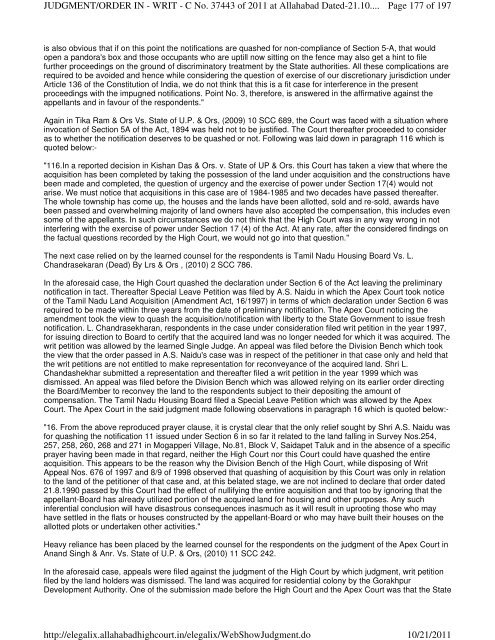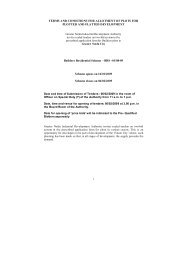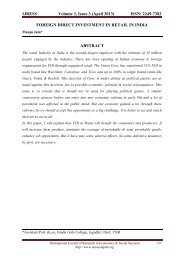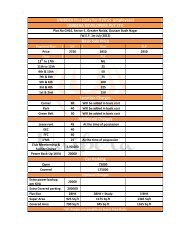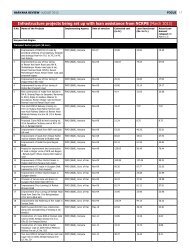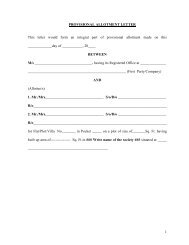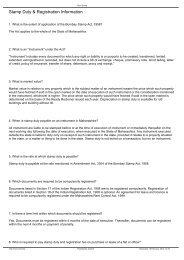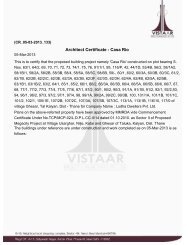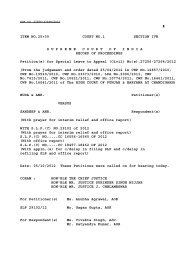eLegalix - Allahabad High Court Judgment Information System ...
eLegalix - Allahabad High Court Judgment Information System ...
eLegalix - Allahabad High Court Judgment Information System ...
You also want an ePaper? Increase the reach of your titles
YUMPU automatically turns print PDFs into web optimized ePapers that Google loves.
JUDGMENT/ORDER IN - WRIT - C No. 37443 of 2011 at <strong>Allahabad</strong> Dated-21.10....http://elegalix.allahabadhighcourt.in/elegalix/WebShow<strong>Judgment</strong>.doPage 177 of 19710/21/2011is also obvious that if on this point the notifications are quashed for non-compliance of Section 5-A, that wouldopen a pandora's box and those occupants who are uptill now sitting on the fence may also get a hint to filefurther proceedings on the ground of discriminatory treatment by the State authorities. All these complications arerequired to be avoided and hence while considering the question of exercise of our discretionary jurisdiction underArticle 136 of the Constitution of India, we do not think that this is a fit case for interference in the presentproceedings with the impugned notifications. Point No. 3, therefore, is answered in the affirmative against theappellants and in favour of the respondents."Again in Tika Ram & Ors Vs. State of U.P. & Ors, (2009) 10 SCC 689, the <strong>Court</strong> was faced with a situation whereinvocation of Section 5A of the Act, 1894 was held not to be justified. The <strong>Court</strong> thereafter proceeded to consideras to whether the notification deserves to be quashed or not. Following was laid down in paragraph 116 which isquoted below:-"116.In a reported decision in Kishan Das & Ors. v. State of UP & Ors. this <strong>Court</strong> has taken a view that where theacquisition has been completed by taking the possession of the land under acquisition and the constructions havebeen made and completed, the question of urgency and the exercise of power under Section 17(4) would notarise. We must notice that acquisitions in this case are of 1984-1985 and two decades have passed thereafter.The whole township has come up, the houses and the lands have been allotted, sold and re-sold, awards havebeen passed and overwhelming majority of land owners have also accepted the compensation, this includes evensome of the appellants. In such circumstances we do not think that the <strong>High</strong> <strong>Court</strong> was in any way wrong in notinterfering with the exercise of power under Section 17 (4) of the Act. At any rate, after the considered findings onthe factual questions recorded by the <strong>High</strong> <strong>Court</strong>, we would not go into that question."The next case relied on by the learned counsel for the respondents is Tamil Nadu Housing Board Vs. L.Chandrasekaran (Dead) By Lrs & Ors , (2010) 2 SCC 786.In the aforesaid case, the <strong>High</strong> <strong>Court</strong> quashed the declaration under Section 6 of the Act leaving the preliminarynotification in tact. Thereafter Special Leave Petition was filed by A.S. Naidu in which the Apex <strong>Court</strong> took noticeof the Tamil Nadu Land Acquisition (Amendment Act, 16/1997) in terms of which declaration under Section 6 wasrequired to be made within three years from the date of preliminary notification. The Apex <strong>Court</strong> noticing theamendment took the view to quash the acquisition/notification with liberty to the State Government to issue freshnotification. L. Chandrasekharan, respondents in the case under consideration filed writ petition in the year 1997,for issuing direction to Board to certify that the acquired land was no longer needed for which it was acquired. Thewrit petition was allowed by the learned Single Judge. An appeal was filed before the Division Bench which tookthe view that the order passed in A.S. Naidu's case was in respect of the petitioner in that case only and held thatthe writ petitions are not entitled to make representation for reconveyance of the acquired land. Shri L.Chandashekhar submitted a representation and thereafter filed a writ petition in the year 1999 which wasdismissed. An appeal was filed before the Division Bench which was allowed relying on its earlier order directingthe Board/Member to reconvey the land to the respondents subject to their depositing the amount ofcompensation. The Tamil Nadu Housing Board filed a Special Leave Petition which was allowed by the Apex<strong>Court</strong>. The Apex <strong>Court</strong> in the said judgment made following observations in paragraph 16 which is quoted below:-"16. From the above reproduced prayer clause, it is crystal clear that the only relief sought by Shri A.S. Naidu wasfor quashing the notification 11 issued under Section 6 in so far it related to the land falling in Survey Nos.254,257, 258, 260, 268 and 271 in Mogapperi Village, No.81, Block V, Saidapet Taluk and in the absence of a specificprayer having been made in that regard, neither the <strong>High</strong> <strong>Court</strong> nor this <strong>Court</strong> could have quashed the entireacquisition. This appears to be the reason why the Division Bench of the <strong>High</strong> <strong>Court</strong>, while disposing of WritAppeal Nos. 676 of 1997 and 8/9 of 1998 observed that quashing of acquisition by this <strong>Court</strong> was only in relationto the land of the petitioner of that case and, at this belated stage, we are not inclined to declare that order dated21.8.1990 passed by this <strong>Court</strong> had the effect of nullifying the entire acquisition and that too by ignoring that theappellant-Board has already utilized portion of the acquired land for housing and other purposes. Any suchinferential conclusion will have disastrous consequences inasmuch as it will result in uprooting those who mayhave settled in the flats or houses constructed by the appellant-Board or who may have built their houses on theallotted plots or undertaken other activities."Heavy reliance has been placed by the learned counsel for the respondents on the judgment of the Apex <strong>Court</strong> inAnand Singh & Anr. Vs. State of U.P. & Ors, (2010) 11 SCC 242.In the aforesaid case, appeals were filed against the judgment of the <strong>High</strong> <strong>Court</strong> by which judgment, writ petitionfiled by the land holders was dismissed. The land was acquired for residential colony by the GorakhpurDevelopment Authority. One of the submission made before the <strong>High</strong> <strong>Court</strong> and the Apex <strong>Court</strong> was that the State


